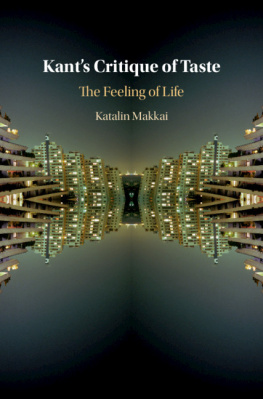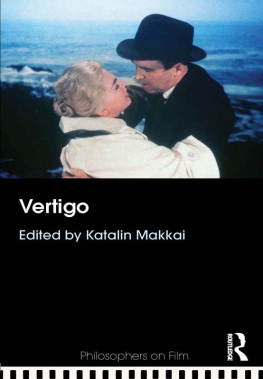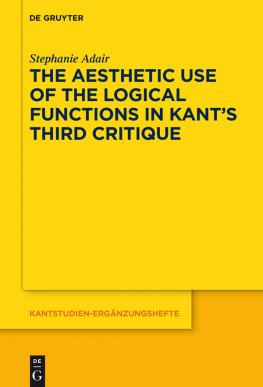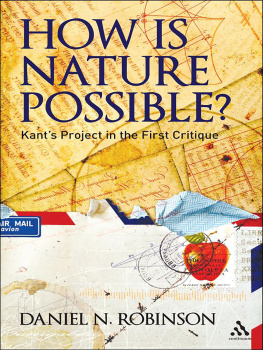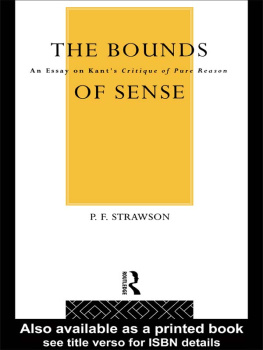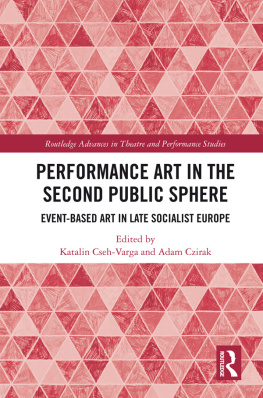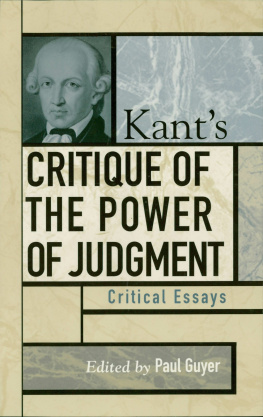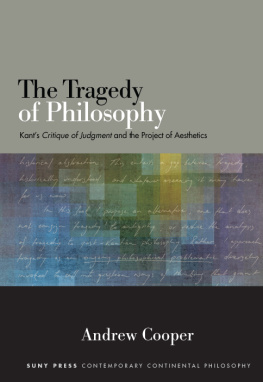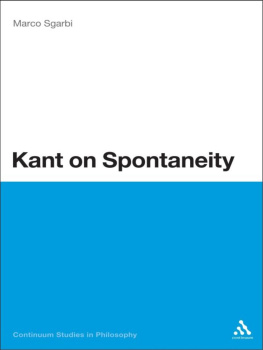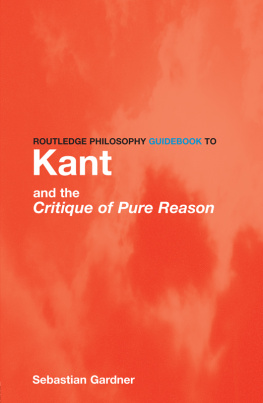Katalin Makkai - Kants Critique of Taste: The Feeling of Life
Here you can read online Katalin Makkai - Kants Critique of Taste: The Feeling of Life full text of the book (entire story) in english for free. Download pdf and epub, get meaning, cover and reviews about this ebook. year: 2021, publisher: Cambridge University Press, genre: Science. Description of the work, (preface) as well as reviews are available. Best literature library LitArk.com created for fans of good reading and offers a wide selection of genres:
Romance novel
Science fiction
Adventure
Detective
Science
History
Home and family
Prose
Art
Politics
Computer
Non-fiction
Religion
Business
Children
Humor
Choose a favorite category and find really read worthwhile books. Enjoy immersion in the world of imagination, feel the emotions of the characters or learn something new for yourself, make an fascinating discovery.
- Book:Kants Critique of Taste: The Feeling of Life
- Author:
- Publisher:Cambridge University Press
- Genre:
- Year:2021
- Rating:4 / 5
- Favourites:Add to favourites
- Your mark:
- 80
- 1
- 2
- 3
- 4
- 5
Kants Critique of Taste: The Feeling of Life: summary, description and annotation
We offer to read an annotation, description, summary or preface (depends on what the author of the book "Kants Critique of Taste: The Feeling of Life" wrote himself). If you haven't found the necessary information about the book — write in the comments, we will try to find it.
Kants Critique of Taste: The Feeling of Life — read online for free the complete book (whole text) full work
Below is the text of the book, divided by pages. System saving the place of the last page read, allows you to conveniently read the book "Kants Critique of Taste: The Feeling of Life" online for free, without having to search again every time where you left off. Put a bookmark, and you can go to the page where you finished reading at any time.
Font size:
Interval:
Bookmark:

Kants Critique of Taste
Immanuel Kants Critique of Judgment is widely recognized as a founding document of modern aesthetics, but its legacy has fallen into disrepute. In this book, Katalin Makkai calls for the rediscovery of Kants aesthetics, showing that its centerpiece, his investigation of the judgment of taste, paints a compelling portrait of our relationships with works of art that we love. At its heart is a scene of aesthetic encounter in which one feels oneself to be animated brought to life by an object, finding there to be something in ones experience of it, beyond what there is to know about it, that one wants to explore and articulate. Tracing Kants insight that to judge is to reveal ones sense of what bears judging, and hence of what matters, Makkai situates Kants aesthetics within his larger study, begun in the first Critique , of judgments fundamental role in the life of the mind.
Katalin Makkai is Professor of Philosophy at Bard College Berlin. She has published articles on Kant and film, and is the editor of Vertigo (2012).
Kants Critique of Taste
The Feeling of Life
Katalin Makkai
Bard College Berlin


University Printing House, Cambridge CB 2 8 BS , United Kingdom
One Liberty Plaza, 20th Floor, New York, NY 10006, USA
477 Williamstown Road, Port Melbourne, VIC 3207, Australia
314321, 3rd Floor, Plot 3, Splendor Forum, Jasola District Centre, New Delhi 110025, India
79 Anson Road, #0604/06, Singapore 079906
Cambridge University Press is part of the University of Cambridge.
It furthers the Universitys mission by disseminating knowledge in the pursuit of education, learning, and research at the highest international levels of excellence.
www.cambridge.org
Information on this title: www.cambridge.org/9781108497794
DOI: 10.1017/9781108596893
Katalin Makkai 2021
This publication is in copyright. Subject to statutory exception and to the provisions of relevant collective licensing agreements, no reproduction of any part may take place without the written permission of Cambridge University Press.
First published 2021
A catalogue record for this publication is available from the British Library.
Library of Congress Cataloging-in-Publication Data
Names: Makkai, Katalin, author.
Title : Kants critique of taste : the feeling of life / Katalin Makkai, Bard College Berlin.
Description: Cambridge, United Kingdom ; New York, NY, USA : Cambridge University Press, 2020. | Includes bibliographical references and index.
Identifiers: LCCN 2019051349 (print) | LCCN 2019051350 (ebook) | ISBN 9781108497794 (hardback) | ISBN 9781108708777 (paperback) | ISBN 9781108596893 (epub)
Subjects: LCSH: Kant, Immanuel, 1724-1804. | Aesthetics. | Judgment (Aesthetics)
Classification: LCC B 2798 . M 265 2020 (print) | LCC B 2798 (ebook) | DDC 111/.85dc23
LC record available at https://lccn.loc.gov/2019051349
LC ebook record available at https://lccn.loc.gov/2019051350
ISBN 978-1-108-49779-4 Hardback
Cambridge University Press has no responsibility for the persistence or accuracy of URLs for external or third-party internet websites referred to in this publication and does not guarantee that any content on such websites is, or will remain, accurate or appropriate.
Many individuals and institutions have helped me through this project, on which I have worked, on and off, for a long time. I have learned a great deal from conversations with my students in courses taught at Barnard College, Columbia University, and Bard College Berlin. I have also benefited from discussions with audiences at Simon Fraser University, Barnard College, Columbia University, the CUNY Graduate Center, Kenyon College, a conference on beauty at Auburn University, and several meetings of the American Society for Aesthetics, where I presented early versions of parts of this book, and with participants in a congenial Kant-Kurs held at the University of Siegen. It is a pleasure to thank Pirachula Chulanon in print for his excellent research assistance. I am grateful to Barnard College and Bard College Berlin for their support of my work.
Over countless conversations, my dear friend Rachel Zuckert gave indispensable feedback on drafts of these chapters. I cannot thank her enough for her suggestions and advice, always wildly intelligent, sensible, and kind, and for her unflagging encouragement, without which this book would be only a gleam in my eye. I have been buoyed by the support of Kelly Dean Jolley, Michael Kelly, Fred Neuhouser, and Charles Parsons. Richard Moran has been a wonderful mentor and a great friend, and I have drawn heavily on what I have learned from his writing and in conversation. I wish that I could give a copy of this book to Stanley Cavell as a token of my gratitude for all that he has given me as a thinker, teacher, mentor, and friend.
I spent quite a few summers working toward this book in San Francisco, and I credit the progress I made to the happiness of life in the company of sta, Dore Bowen, Rebecca Groves, and Rebecca McLennan. During Anne-Galle Argys impromptu gift of a stay in her Paris flat, the manuscript turned a decisive corner. Gabriele Zipf and Manfred Roeder cheered me on in Berlin, by the sea, in the mountains, and on a river, and heroically endured questions about Kants German.
I thank Hilary Gaskin, Hal Churchman, and Thomas Haynes at Cambridge University Press for their expert and impeccable guidance and generous support. I am grateful to Divya Arjunan and her Production Team at SPi Global for their meticulous work and patience. My thanks go also to the anonymous readers who reviewed my manuscript.
An earlier version of was published as Kant on Recognizing Beauty, European Journal of Philosophy 18, no. 3 (2010). The argument has been somewhat reworked. I am grateful to the journal for permission to reprint.
I dedicate this book to Zsuzsanna Bencsth-Makkai, Mihly Makkai, Katalin Bencsath, Mihaly Mezei, Maria Bencsath, and John Douwes, sok szeretettel s hlval.
Kants Critique of Pure Reason is cited by the page numbers of the first (A) and second (B) editions. Kants other works are cited by title or abbreviated title and by volume and page number of Kants gesammelte Schriften (Berlin: Reimer, later de Gruyter, 1902), also known as the Akademie edition. FI is the abbreviated title of the first, originally unpublished, introduction to the Critique of Judgment . CJ abbreviates the title of the Critique of Judgment .
Quoted translations of Kants writings are based on the Cambridge University Press translations specified in the Bibliography. I have often modified the translations, and often silently.
References by name to sections of Kants works are capitalized (e.g., the Analytic of the Beautiful), and references to the corresponding subject matter are lowercased (e.g., the analytic of the beautiful).
I recognize the phenomenon that Smith is describing, and I share the sense of its significance, its being worth articulating and reflecting upon. Judging by the essays reception, I am not alone. I expect that I am also not alone in finding Smiths characterization of her transformation to ring a certain bell. Kants Critique of Judgment springs to mind, since there Kant too, and famously, writes of an aesthetic attunement. The association could be superficial, two writers having hit upon the same appealing term to capture ideas that ultimately have little in common. But in my view there is a genuine and interesting affinity between Smiths and Kants visions of aesthetic attunement.
Font size:
Interval:
Bookmark:
Similar books «Kants Critique of Taste: The Feeling of Life»
Look at similar books to Kants Critique of Taste: The Feeling of Life. We have selected literature similar in name and meaning in the hope of providing readers with more options to find new, interesting, not yet read works.
Discussion, reviews of the book Kants Critique of Taste: The Feeling of Life and just readers' own opinions. Leave your comments, write what you think about the work, its meaning or the main characters. Specify what exactly you liked and what you didn't like, and why you think so.

